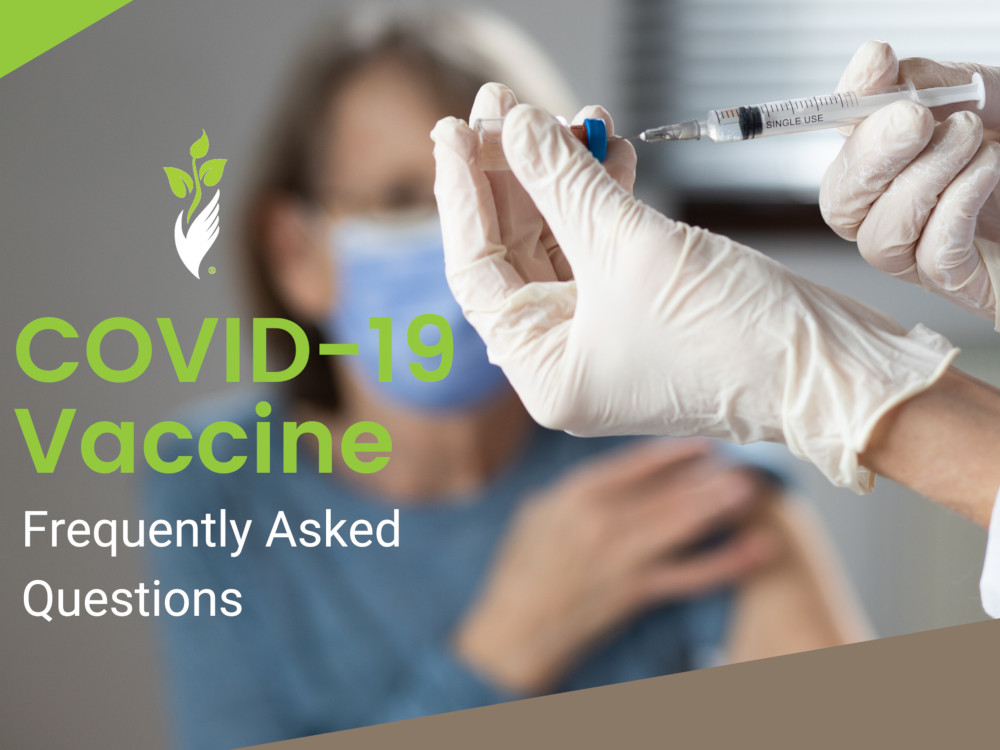Frequently Asked Questions Regarding the COVID-19 Vaccine
Published January 26, 2021 by R. Bradley Robinson, M.D. in Senior Health & Wellness

COVID-19 has made a substantial imprint on the fabric of our nation and our individual lives. Since last February, over 24 million cases have been recorded in the United States, with over 413,000 lives lost due to coronavirus. These lives, of course, are so much more than a number or statistic, and we extend our condolences to those of you who have been impacted by the loss of loved ones over this last year.
As we soon come upon the 1-year mark of reckoning with this pandemic, there is hope disseminating to communities across the nation in the form of vaccine shipments. While the first wave of vaccines was mainly prioritized for front line health workers and long term care facility residents at the highest risk, some states have started vaccinating additional patients, with other states soon to follow. Over time, the COVID-19 vaccine will become widely available for the general population. With this in mind, let us take a look at 5 key questions related to the COVID-19 vaccine.
When will I be able to receive the COVID-19 vaccine?
The short answer is, it depends. While the Center for Disease Control and Prevention (CDC) has made recommendations for the prioritized distribution of vaccines, much of the logistics and distribution policy ultimately depends on state and local governments. In Phase 1a, started in December 2020, the CDC recommended vaccinating healthcare personnel and residents in long term care facilities. The phase 1b recommendation includes persons aged 75 and older with other frontline essential workers (e.g. fire fighters, paramedics, etc.), while the phase 1c recommendation includes persons aged 65-74 along with younger persons with underlying medical conditions.
Visit the CDC Health Department Directory to find out more information about how your state or local Department of Health plans to distribute the COVID-19 vaccine.
Which vaccines are available and are they effective?
At the time of writing, two vaccines are approved for use in the United States, the Pfizer-BioNTech Covid-19 vaccine and the Moderna Covid-19 vaccine. In clinical trials, the Pfizer-BioNTech vaccine was overall 95% effective at preventing COVID-19 illness and the Moderna vaccine was overall 94.1% effective. Additional vaccines from AstraZeneca, Jannsen, and Novavax are in Phase 3 clinical trials and could be approved in the coming months.
How many vaccine shots are required?
Both Pfizer-BioNTech and Moderna vaccines are designed to have two shots administered. The Pfizer-BioNTech vaccine spaces the shot 21 days apart, while the Moderna vaccine is spaced 28 days apart. The effectiveness data (95% and 94.1% effectiveness, respectively) is based on receiving both doses. All but one vaccine in the phase 3 clinical trials require two shots for maximum efficacy.
What side effects can I expect after receiving the COVID vaccine?
Side effects following the vaccine are usually mild to moderate. Severe side effects or severe allergic reactions have been reported but are uncommon. After the shot, common side effects may include pain or swelling at the injection site, as well as a fever, headache, chills, and fatigue. These side effects are the result of your immune system activating to form protective antibodies against COVID-19. If you experience these symptoms, you can talk with your physician about taking over the counter medication such as acetaminophen or ibuprofen for relief.
In addition to reporting any concerning symptoms to your physician, you can also download the V-Safe app from the CDC, which will give you “personalized check-ins after receiving a COVID-19 vaccine.” This app allows you to report any side effects directly to the CDC, as they may call to check on you depending on your answers.
Can I receive the COVID-19 vaccine if I have an egg or latex allergy?
The Pfizer-BioNTech and Moderna vaccines do not contain eggs, latex, or preservatives. Any allergy to egg or latex should therefore not keep you from receiving the vaccine.
In conclusion, it is understandable that you may have many questions about the COVID-19 vaccine. While every state and county may have different policies on vaccination, don’t hesitate to seek out more information from your local health department. Sign up for email lists or alert notifications that can keep you updated regarding vaccine availability and other important information. And as always, be sure to raise any concerns with your physician or health care provider so that you can be fully informed about your health and the health of your loved ones.
If you have questions about senior home
care services or if you want to start care:
Related Posts

January 27, 2025
Is There a Food Allowance Card for Seniors?
Jody Guerrieri, RN.

January 27, 2025
What Causes Glassy Eyes in the Elderly?
Jody Guerrieri, RN.

January 27, 2025
What Age Is Considered a Senior Citizen?
Jody Guerrieri, RN.
Helping seniors age in place, with dignity & grace.